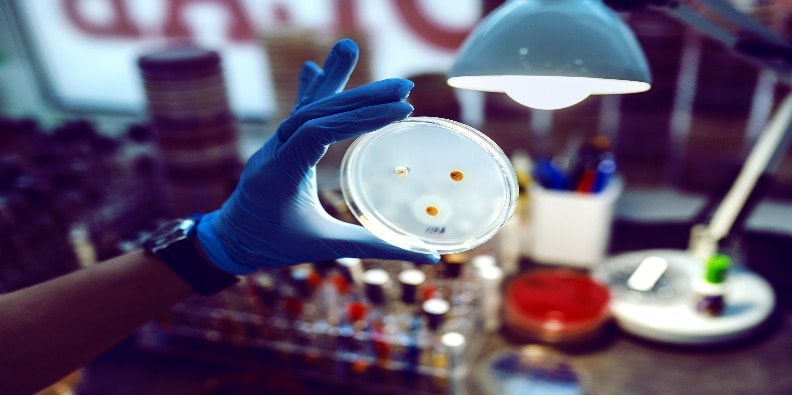
Biological Activity Tests

One of the studies that should be carried out on antiseptics and disinfectants, which are widely used in the food industry, households and organizations, medical and veterinary fields, is the evaluation of bactericidal activity. Bactericidal effect can be determined using reference strains such as E.coli, P.aeruginosa, S.aureus, E.hirae. The effects of biocidal products on bacteria is an important parameter that should be analyzed for the determination of the area of use of the product or the inspection of the product to be offered for sale, licensing procedures.
- S.aureus ATCC 6538
- P.aeruginosa ATCC 15442
- E.coli ATCC 10536
- E.hirae ATCC 10541
- M.avium ATCC 15769,
- M.terrae ATCC 15755
You can contact us for "Evaluation of Bactericidal Activity" studies on biocidal products.
The evaluation of fungicidal and yeacidal activities is an important parameter in the licensing of antiseptics and disinfectants used against microorganisms such as fungi and yeasts that can be found in the food industry, homes and institutions, hospitals and veterinary environments. It is based on the principle of determining the effects of the biocidal product on microorganisms over a certain period of time.
- C.albicans ATCC 10231
- Aspergillus brasiliensis ATCC 16404
You can contact us for "Evaluation of Fungicidal and Yeacidal Activities" studies in biocidal products.
Under certain conditions, some microorganisms form special forms inside the cell, called spores, which are more resistant to external conditions. Spores can maintain their vitality in the event of the death of microorganisms, and when suitable conditions occur, they can transform back into a bacterial cell. Since spores that can be found in the food industry, homes and organizations are harmful to human health, the antiseptics and disinfectants to be used should be sporicidal.
- B.subtilis ATCC 6633
You can contact us for "Evaluation of Sporicidal Activity" studies on biocidal products.
Viruses are microorganisms that can survive in the environment but multiply after entering the human body. There are many types of viruses that cause disease, such as the Corona Virus, which has recently shaken the world. Evaluation of their effectiveness on viruses is important for the licensing and launch of biocidal products
- Poliovirus Type 1, L
- Adenovirus Type 5, strain Adenoid 75, ATCC VR-5
- Murinenorovirus, strain S99 Berlin
- Bacteriophage P001, Bacteriophage P008
You can contact us for "Evaluation of Virucidal Activity" studies in biocidal products.
Legionella are a genus of bacteria that occur naturally in freshwater and wet soil. They colonize artificial water systems when the right conditions are created for their growth. Legionella multiply in warm water (25 to 45°C) and reach the lungs by inhaling polluted water particles suspended in the air.
Legionellosis (or legionnaires' disease) can develop in people in mild or more severe forms and can lead to death in 11% of cases. This disease is now a notifiable infectious disease.
Specifies a test method and minimum requirements for bactericidal activity of chemical disinfectant products intended for use for the treatment of aqueous systems against Legionella pneumophila.
You can contact us for "Evaluation of Bactericidal Activity Against Legionella" studies in biocidal products.
The evaluation of mycobactericidal and tuberculocidal activity of Chemical Disinfectants and Antiseptics in Public and Personal Areas, Medical Areas is carried out within the scope of our accreditation within the scope of appropriate tests and analyzes.
- Mycobacterium avium
- Mycobacterium intracellulare (MAI)
- Mycobacterium kansasii
- Mycobacterium chelonae
You can contact us for "Evaluation of Mycobactericidal and Tuberculocidal Activity" studies in biocidal products.
Tests and analyzes are carried out accredited to determine the bactericidal effectiveness of disinfectants used in environments such as pool water and SPA.
You can contact us for "Evaluation of Bactericidal Efficacy" studies in biocidal products.
EN 14561: Chemical disinfectants and antiseptics. Quantitative carrier test for the assessment of bactericidal activity for medical instruments. Test method and requirements (stage 2, step 2)
You can contact us for studies on "Quantitative Carrier Assay for the Evaluation of Bactericidal Efficacy of Medical Devices" in biocidal products.
EN 14562: Chemical disinfectants and antiseptics - Quantitative carrier assay for the evaluation of fungicidal or yeasticidal activity for medical instruments - Test method and requirements (stage 2, step 2)
You can contact us for studies on "Quantitative Carrier Assay for the Evaluation of Fungicidal and Yeast Killer Efficacy of Medical Devices" in biocidal products.
EN 14563: Chemical disinfectants and antiseptics - Quantitative carrier test for the evaluation of mycobactericidal or tuberculocidal activity of chemical disinfectants used for instruments in the medical field - Test method and requirements (stage 2, step 2)
You can contact us for "Quantitative Carrier Assay for the Evaluation of Mycobactericidal or Tuberculocidal Activity of Chemical Disinfectants and Antiseptics Used in Medical Instruments" studies in biocidal products.
EN 14563: Chemical disinfectants and antiseptics - Quantitative carrier test for the evaluation of mycobactericidal or tuberculocidal activity of chemical disinfectants used for instruments in the medical field - Test method and requirements (stage 2, step 2)
You can contact us for "Quantitative Carrier Assay for the Evaluation of Mycobactericidal or Tuberculocidal Activity of Chemical Disinfectants and Antiseptics Used in Medical Instruments" studies in biocidal products.
EN 16615: Chemical disinfectants and antiseptics. Quantitative test method (4-field test) for the evaluation of bactericidal and yeasticidal activity on mechanically acting non-porous surfaces using wipes in the medical field. Test method and requirements (stage 2, step 2)
You can contact us for the studies of "Quantitative Experimental Method for the Evaluation of Bactericidal and Fermentation Activity on Non-Porous Surfaces with the Help of Wipes Used by Applying Mechanical Movement in the Medical Field (4- Field Experiment)" in biocidal products.
EN 15457: Paints and varnishes - Laboratory method for testing the effectiveness of film protectants against fungi in a coating
You can contact us for studies on "Evaluation of the Effectiveness of Film Preservatives Against Fungi in a Coating" in biocidal products.